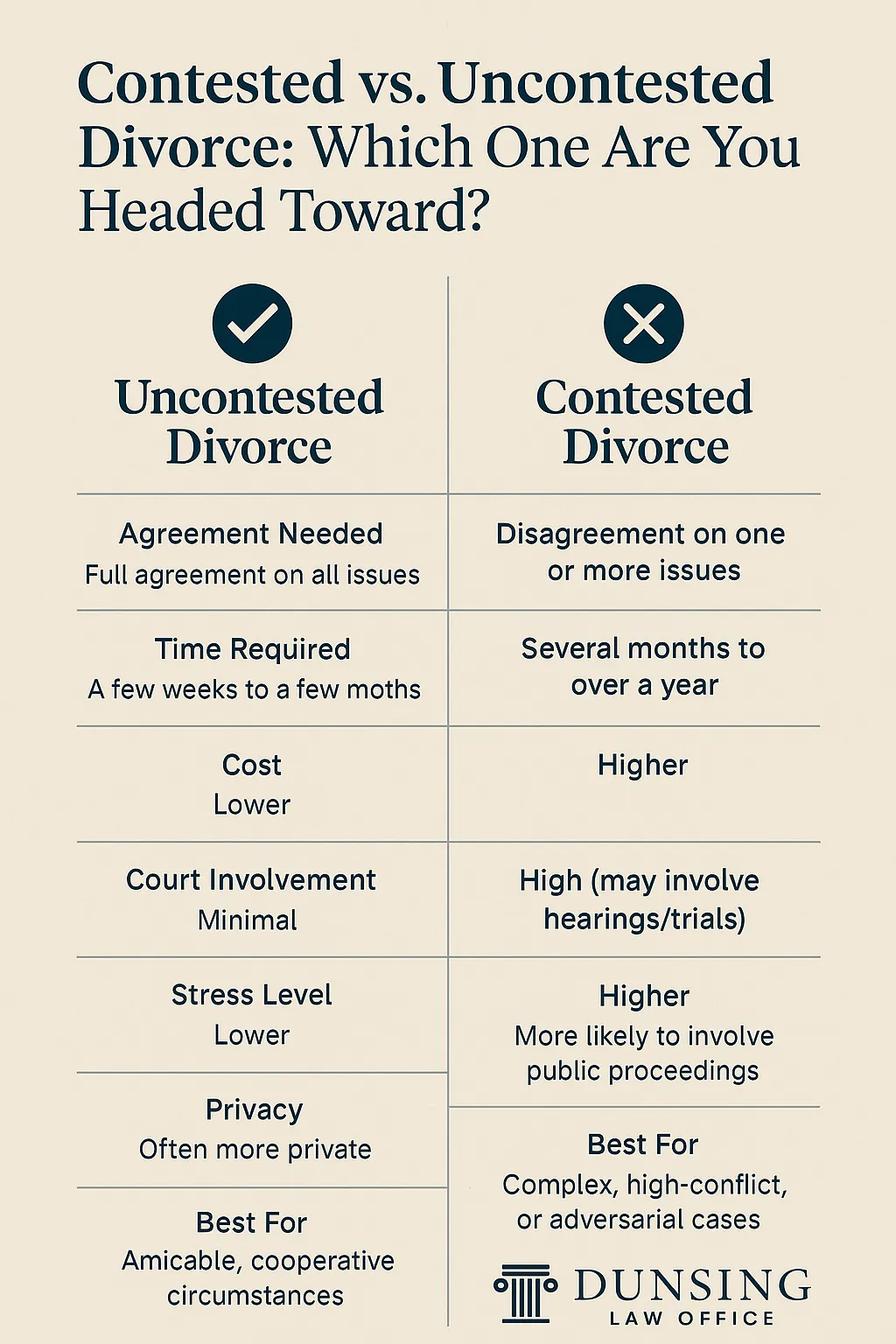
Contested vs. Uncontested Divorce: Which One Are You Headed Toward?
Contested vs. Uncontested Divorce: Which One Are You Headed Toward?
A side-by-side comparison of divorce types to help you identify where your case is likely going
Discovering that your marriage is heading toward divorce is overwhelming. Emotions run high, the future feels uncertain, and you're probably wondering, “What happens next?” One of the first big questions you’ll face is whether your divorce will be contested or uncontested—and understanding the difference can help you prepare for the road ahead.
At Dunsing Law, we believe clarity is power. Let’s break down the key differences between contested and uncontested divorce so you can begin to understand what kind of process you might be looking at.
⚖️ What Is an Uncontested Divorce?
An uncontested divorce happens when both spouses agree on all major issues, including:
Division of property and debts
Child custody and parenting time
Child support
Spousal support (alimony)
This doesn’t mean everything is perfect—but it does mean both sides are willing to cooperate and sign off on the terms without going to court.
Best suited for: Couples who are able to communicate, compromise, and prioritize efficiency
Timeframe: Often finalized in just a few months
Cost: Typically lower legal fees and court costs
Emotional impact: Generally less stressful and confrontational
⚖️ What Is a Contested Divorce?
A contested divorce means there are disagreements on one or more key issues. You and your spouse may not see eye-to-eye on child custody, finances, or how to divide property. When that happens, negotiation, mediation, and sometimes litigation in front of a judge becomes necessary.
Best suited for: Situations where one party is uncooperative or there are significant disputes
Timeframe: Can take several months to over a year
Cost: Higher, due to legal fees, court appearances, and expert involvement
Emotional impact: More intense, but sometimes necessary to protect your rights and interests
🧾 Side-by-Side Comparison
Feature Uncontested Divorce Contested Divorce Agreement Needed Full agreement on all issues Disagreement on one or more issues Time Required A few weeks to a few months Several months to over a year Cost Lower Higher Court Involvement Minimal High (may involve hearings/trials) Stress Level Lower Higher Privacy Often more private More likely to involve public proceedings Best For Amicable, cooperative circumstances Complex, high-conflict, or adversarial cases
🧭 Which One Are You Headed Toward?
Ask yourself:
Are you and your spouse still communicating respectfully?
Do you both want to move forward efficiently and fairly?
Can you compromise on custody, assets, and finances?
If yes, you're likely heading toward an uncontested divorce.
If not—if there's conflict, distrust, or complex issues—you may need to prepare for a contested divorce. That’s perfectly okay, and we can help.
🛡️ Dunsing Law Is Here to Guide You
Whether your divorce is straightforward or full of unknowns, you don’t have to face it alone. At Dunsing Law, we provide experienced, steady guidance through both contested and uncontested divorces—always protecting your rights and advocating for your future.
Call us today to schedule your consultation and take the first step toward clarity and resolution.